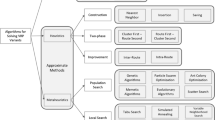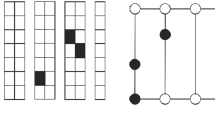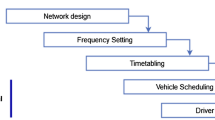Abstract
Here, a general methodology is proposed to formulate and solve any multidimensional balanced/unbalanced, constrained/unconstrained transportation problems(TP) in different environments(crisp/fuzzy/rough). To understand the general model easily, here, at first, a multi-item 5-dimensional fixed charge profit maximization TP under budget and time constraint is presented. A potential solution of the problem is coded as a permutation of the different cells of the allocation matrix. A general decoding rule is proposed to determine the actual allocation from this coded solution. A heuristic approach is applied on a set of randomly generated coded solution of the target problem to determine the marketing decision. Applying swap operations on the coded solutions, the perturbation rules of the heuristic Particle Swarm Optimization(PSO) are modified to solve the problem. In a particular case, the problem is analysed as a bi-criteria decision making problem with the maximization of the total profit as well as the minimization of the total shipment time under a budget constraint. The bi-criteria TP is formulated as a single objective optimisation problem using a proposed rule and the same heuristic is run for a finite number of times to determine the pareto optimal front. To formulate the problem in the fuzzy(rough) environment an approach is proposed using credibility(trust) measure of fuzzy(rough) events. Proper fuzzy(rough) simulation algorithms are also proposed to solve the problem for any type of fuzzy(rough) estimation. Using this approach no crisp equivalent of any imprecise parameters is used for the marketing decision. Due the unavailability of the test data in the literature, different hypothetical data sets are used for the illustration of the models.


Similar content being viewed by others
Data Availability
Enquiries about data availability should be directed to the authors.
References
Akhand MAH, Akter S, Rashid MA (2013) Velocity tentative particle swarm optimiza- tion to solve TSP, International Conference on Electrical Information and Communication Technology (EICT)
Bakhayt A-GK (2016) Solving bi-objective 4-dimensional transportation problem by using PSO. Sci Int Lahore 28:2403–2410
Bit AK, Biswal MP, Alam SS (1993) Fuzzy programming approach to multi-objective solid transportation problem. Fuzzy Sets Syst 57:183–194
Dubois D, Prade H (1983) Ranking fuzzy numbers in the setting of possibility theory, Information. Science 30:183–224
Eberhart RC, Kennedy J (1995) A new optimizer using Particle swarm theory, In: Proceedings of the Sixth International Symposium on micro machine and human science, pp. 39-43
Engelbrecht AP (2005) Fundamentals of Computational Swarm Intelligence, John Wiley and Sons, Ltd
Esmin A, Aoki A, Lambert-Torres RG (2002) Particle swarm optimization for fuzzy mem- bership functions optimization. IEEE Int Conf Syst Man Cybernet 3:6–9
Feng HM (2005) Particle swarm optimization learning fuzzy systems design, In: Proceedings of the ICITA 3rd International Conference on Information Technology and Applications, 1: 363-366
Gottlieb J, Paulmann L (1998) Genetic algorithms for the fixed charge transportation problems, In: Proceedings of the IEEE Conference on Evolutionary Computation, ICEC, 330-335
Giri PK, Maiti MK, Maiti M (2013) Entropy based solid transportation problems with discounted unit costs under fuzzy random environment. Opsearch. https://doi.org/10.1007/s12597-013-0155-0
Giri PK, Maiti MK, Maiti M (2014) Fuzzy stochastic solid transportation problem using fuzzy goal programming approach. Comput Ind Eng 72:160–168
Giri PK, Maiti MK, Maiti M (2015) Fully fuzzy fixed charge multi-item solid transportation problem. Appl Soft Comput 27:77–91
Giri PK, Maiti MK, Maiti M (2016) Profit maximization of solid transportation problem under budget constraint using fuzzy measures. Iran J Fuzzy Syst 13(5):35–63
Haley KB (1962) The solid transportation problem. Oper Res 11:446–448
Haque S, Bhurjee AK, Kumar P (2022) Multi-objective non-linear solid transportation problem with fixed charge, budget constraints under uncertain environments. Syst Sci Control Eng 10(1):899–909. https://doi.org/10.1080/21642583.2022.2137707
Hitchcock FL (1941) The distribution of a product from several sources to numerous localities. J Math Phys 20:224–230
Hirsch WM, Dantzig GB (1968) The fixed charge transportation problem. Naval Res Logis Q 15:413–424
Jimenez F, Verdegay JL (1999) Solving fuzzy solid transportation problems by an evolutionary algorithm based parametric approach. Eur J Oper Res 117:485–510
Kar MB, Kundu P, Kar S, Pal T (2018) A multi-objective multi-item solid transportation problem with vehicle cost, volume and weight capacity under fuzzy environment. J Intell Fuzzy Syst 35(2):1991–1999. https://doi.org/10.3233/JIFS-171717
Kennedy J, Eberhart RC (1995) Particle swarm optimisation, In: Proceedings of the IEEE International Joint Conference on Neural Network, IEEE Press, 4, 1942-1948
Kennington JL, Unger VE (1976) A new branch and bound algorithm for the fixed charge transportation problem. Manage Sci 22:1116–1126
Kundu P, Kar S, Maiti M (2013) Multi-objective multi-item solid transportation problem in fuzzy environment. Appl Math Model 37:2028–2038
Kundu P, Kar S, Maiti M (2014) Multi-objective solid transportation problems with budget constraint in uncertain environment. Int J Syst Sci 45(8):1668–1682. https://doi.org/10.1080/00207721.2012.748944
Kundu P, Kar MB, Kar S, Pal T, Maiti M (2017) A solid transportation model with product blending and parameters as rough variables. Soft Comput 21:2297–2306. https://doi.org/10.1007/s00500-015-1941-9
Kundu P, Kar S, Maiti M (2015) Multi-item solid transportation problem with type-2 fuzzy parameters. Appl Soft Comput 31:61–80
Kocken HG, Sivri M (2016) A simple parametric method to generate all optimal solutions of Fuzzy Solid Transportation Problem. Appl Math Model 40(7–8):4612–4624
Li Y, Ida K, Gen M (1997) Improved genetic algorithm for solving multi objective solid transportation problem with fuzzy numbers. Comput Ind Eng 33:589–592
Liang JJ, Qin AK, Suganthan PN, Baskar S (2006) Comprehensive learning particle swarm optimizer for global optimization of multimodal functions. IEEE Trans Evol Comput 10:281–295
Liu B (2004) Uncertain Programming- An Introduction to its Axiomatic Foundations. Physica-Verlag, Heidelberg
Liu Y, Liu B (2003) A class of fuzzy random optimization: expected value models, Information. Science 155:89–102
Liu B, Iwamura K (1998) A note on chance constrained programming with fuzzy coefficients. Fuzzy Sets Syst 100:229–233
Liu P, Yang L, L-W, Li S, (2014) A solid transportation problem with type-2 fuzzy variables. Appl Soft Comput 24:543–558
Majumder S, Kundu P, Kar S, Pal T (2018) Uncertain multi-objective multi-item fixed charge solid transportation problem with budget constraint. Soft Comput. https://doi.org/10.1007/s00500-017-2987-7
Maiti MK, Maiti M (2006) Fuzzy inventory model with two warehouses under possibility constraints. Fuzzy Sets Syst 157:52–73
Maiti MK, Maiti M (2006) Fuzzy inventory model with two warehouses under possibility constraints. Fuzzy Sets Syst 157:52–73
Nagarjan A, Jeyaraman K (2010) Solution of chance constrained programming problem for multi-objective interval solid transportation problem under stochastic environment using fuzzy approach. Int J Comput Appl 10(9):19–29
Niksirat M (2022) A new approach to solve fully fuzzy multi-objective transportation problem. Fuzzy Inform Eng 14(4):456–467
Ojha A, Das B, Mondal S, Maiti M (2010) A stochastic discounted multi-objective solid transportation problem for breakable items using analytical hierarchy process. Appl Math Model 34(2):2256–2271
Ojha A, Das B, Mondal S, Maiti M (2010) A Solid Transportation Problem for an item with fixed charge vechicle cost and price discounted varying charge using Genetic Algorithm. Appl Soft Comput 10:100–110
Ojha A, Das B, Mondal S, Maiti M (2011) Transportation policies for single and multi-objective transportation problem using fuzzy logic. Math Comput Model 53:1637–1646
Ojha A, Das B, Mondal SK, Maiti M (2013) A multi-item transportation problem with fuzzy tolerance. Appl Soft Comput 13(8):3703–3712
Pramanik P, Maiti MK, Maiti M (2017) A supply chain with variable demand under three level trade credit policy. Comput Indu Eng 106:205–221
Pramanik P, Maiti MK, Maiti M (2017) Three level partial trade credit with promotional cost sharing. Appl Soft Comput 58:553–575
Pramanik P, Maiti MK (2019) An inventory model for deteriorating items with inflation induced variable demand under two level partial trade credit: a hybrid ABC-GA approach. Eng Appl Artif Intell 85:194–207
Pramanik P, Maiti MK (2020) Trade credit policy of an inventory model with imprecise variable demand: an ABC-GA approach. Soft Comput 24:9857–9874
Schell ED (1955) Distribution of a product by several properties, in: Proceedings of 2nd Symposium in Linear Programming, DCS/comptroller, HQ US Air Force, Washington,DC, 615-642
Sun M, Aronson JE, Mckeown PG, Dennis D (1998) A tabu search heuristic procedure for fixed charge transportation problem. Eur J Oper Res 106:411–456
Tao Z, Xu J (2012) A class of rough multiple objective programming and its application to solid transportation problem. Inf Sci 188:215-235
Wang KP, Huang L, Zhou CG, Pang W (2003) Particle swarm optimization for travelling salesman problem, In: Proc. International Conference on Machine Learning and Cybernetics, pp. 1583-1585
Yan X, Zhang C, Luo W, Li W, Chen W, Liu H (2012) Solve travelling salesman prob- lem using particle swarm optimization algorithm. Int J Comput Sci Issues 9:264–271
Yang L, Liu L (2007) Fuzzy fixed charge solid transportation problem and algorithm. Appl Soft Comput 7:879–889
Yang L, Yuan F (2007) A bi-criteria solid transportation problem with fixed charge under stochastic environment. Appl Math Model 31:2668–2683
Zadeh LA (1965) Fuzzy Sets. Inform Control 8:338–353
Zadeh LA (1978) Fuzzy Set as a basis for a theory of possibility. Fuzzy Sets Syst 1:3–28
Zimmermann H-J (1978) Fuzzy programming and linear programming with several objective functions. Fuzzy Sets Syst 1:45–55
Funding
There is no funding regarding this research work.
Author information
Authors and Affiliations
Contributions
5-dimensional multi item TP under different constraints in both precise and imprecise environments: Discussion, mathematical formulation, solution methodology, numerical illustration. Multi-dimensional multi item TP: theoretical discussion, mathematical formulation, solution methodology. Fuzzy and Rough Simulation: Algorithm developed and used. Soft Computing technique: Swap sequence based PSO.
Corresponding author
Ethics declarations
Conflict of interest
The authors declares that they have no conflict of interest.
Ethical approval
This article does not contain any studies with human participants or animals performed by any of the authors.
Funding
There is no funding regarding this research work.
Informed Consent
Not applicable.
Additional information
Publisher's Note
Springer Nature remains neutral with regard to jurisdictional claims in published maps and institutional affiliations.
Rights and permissions
Springer Nature or its licensor (e.g. a society or other partner) holds exclusive rights to this article under a publishing agreement with the author(s) or other rightsholder(s); author self-archiving of the accepted manuscript version of this article is solely governed by the terms of such publishing agreement and applicable law.
About this article
Cite this article
Pal, S., Pramanik, P., Maiti, A.K. et al. Multi-dimensional transportation problems in multiple environments: a simulation based heuristic approach. Soft Comput 27, 11603–11628 (2023). https://doi.org/10.1007/s00500-023-08204-x
Accepted:
Published:
Issue Date:
DOI: https://doi.org/10.1007/s00500-023-08204-x




